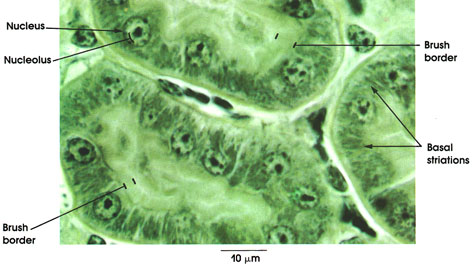

Brush border, basal striations proximal tubules kidney
Ronald A. Bergman, Ph.D., Adel K. Afifi, M.D., Paul M. Heidger,
Jr., Ph.D.
Peer Review Status: Externally Peer Reviewed

Rhesus monkey, Helly's fluid,
iron hematoxylin-orange G, 1416 x.
The cells of the proximal tubule with their apical and basal specializations have the capacity to reabsorb selectively and transport metabolically valuable substances from the glomerular filtrate (e.g., glucose and amino acids), returning them to the vascular system. They also transport and secrete other substances in the lumen of the proximal tubule to be eliminated in the urine.
Nucleus: Round and large with prominent nucleolus.
Brush border: On the luminal surface of the tubule cells. Consists of microvilli that vastly increase the cellular absorptive surface.
Basal striations: Consist of rod-shaped mitochondria contained within compartments formed by specialized infoldings of the basal cell membrane.
Next Page | Previous Page | Section Top | Title Page
Please send us comments by filling out our Comment Form.
All contents copyright © 1995-2025 the Author(s) and Michael P. D'Alessandro, M.D. All rights reserved.
"Anatomy Atlases", the Anatomy Atlases logo, and "A digital library of anatomy information" are all Trademarks of Michael P. D'Alessandro, M.D.
Anatomy Atlases is funded in whole by Michael P. D'Alessandro, M.D. Advertising is not accepted.
Your personal information remains confidential and is not sold, leased, or given to any third party be they reliable or not.
The information contained in Anatomy Atlases is not a substitute for the medical care and advice of your physician. There may be variations in treatment that your physician may recommend based on individual facts and circumstances.
URL: http://www.anatomyatlases.org/